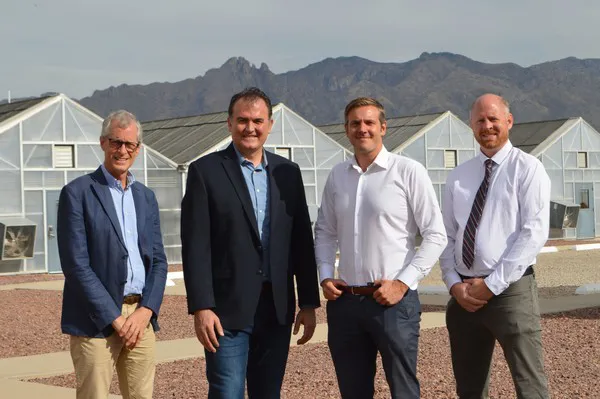“By partnering with the University of Arizona, we are mining the years of the experience that they have in controlled environment agriculture,” says Ryan Lefers, co-founder and chief executive officer of Red Sea Farms.
The Saudi and UAE-based agtech company was founded in 2018 as a spinout from King Abdullah University of Science and Technology (KAUST). The company’s mission is to develop and deliver environmentally sustainable agriculture systems capitalizing on the use of saltwater and sunlight. In January 2022, Red Sea Farms announced its expansion into the United States through its new partnership with the UA-CEAC at the University of Arizona.
According to a recent press release by Red Sea Farms, the University of Arizona is well positioned to evaluate Red Sea Farms’ patented day and night cooling system, humidity control and different monitoring technologies. The University of Arizona has extensive experience in researching, designing and implementing resource-efficient agricultural systems for harsh environments, making it the ideal partner to introduce Red Sea Farms’ technologies to the United States.
“We have a global vision and felt that the United States was the natural first step in that global vision. We see the rise of the greenhouse industry in the United States and we want to be a part of that story,” explains Ryan.
 Left to right: Mark Tester, Chief Science Officer, Red Sea Farms // Murat Kacira, Director of the University of Arizona Controlled Environment Agriculture Center and professor of Biosystems Engineering in College of Agriculture and Life Sciences // Simon Bryant Chief Financial Officer, Red Sea Farms // Ryan Lefers, CEO Red Sea Farms
Left to right: Mark Tester, Chief Science Officer, Red Sea Farms // Murat Kacira, Director of the University of Arizona Controlled Environment Agriculture Center and professor of Biosystems Engineering in College of Agriculture and Life Sciences // Simon Bryant Chief Financial Officer, Red Sea Farms // Ryan Lefers, CEO Red Sea Farms
Red Sea Farms’ cooling technologies based on desiccation
As Ryan explains, Red Sea Farms designed passive and active cooling technologies that combine thermal energy storage and saltwater-based evaporative cooling to maintain the ideal greenhouse temperature. Further, Red Sea Farms’ cooling chambers have superior humidity and pathogen control due to the use of saline liquid desiccants, as well as the ability to drop the temperature quickly when needed.
“High nighttime temperatures greatly impact yield and quality because the plants are burning their stored energy reserves due to high rates of respiration. With our cooling technologies, we avoid this and keep the Brix higher because the plant has more sugars for the fruit,” says Ryan.
Red Sea Farms plans to deploy a cooling chamber at the University of Arizona by Q2, allowing the company to demonstrate the technology’s potential in the United States and other regions experiencing hot temperatures and water scarcity.
Opportunities abound for cooling tech in animal agriculture
While Red Sea Farms has focused on the greenhouse industry through its pilot facility and recent partnership with the University of Arizona, Ryan also notes that the company has seen tremendous potential for their patented system in animal agriculture and is beginning to explore these avenues.
“Animal agriculture is a massive industry in the Arabian Peninsula, the United States and globally. We are doing initial trials in poultry operations to see how we can contribute to the animal agriculture industry. We truly are crop-agnostic, even with plants and animals,” Ryan says.
For more information:
Ryan Lefers, Co-founder and CEO Red Sea Farms
Red Sea Farms
www.redseafarms.com
Jana Hubbard, Head of Brand Development
+966 56 131 6267
jana.hubbard@redseafarms.com
For more information:
University of Arizona
arizona.ceac@gmail.com
www.ceac.arizona.edu
